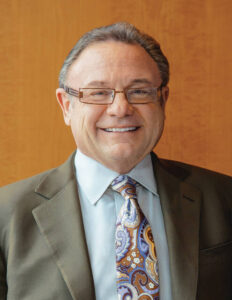
Getting and keeping the best and brightest is a challenge in every industry and it’s particularly acute in West Texas oil and gas business where the “brain drain” with young people graduating from high school and staying gone could threaten long-term prosperity.
That was once the case in the Permian Basin, which had gotten stodgy and unappealing, but conditions are much different now with the advent of new production methods and energy experts say a lot more young talent is getting educated here and staying home and lots more is being drawn in from around the nation and world.
Odessa oilman Kirk Edwards, Waco economist Ray Perryman and Permian Basin International Oil Show President Larry Richards say the region’s future has never looked better.

“In previous decades Midland and Odessa lost considerable young talent to bigger communities as many left here for their higher education and never came back,” Edwards said. “That’s now changing due to numerous reasons.
“One, the Permian Basin was considered a mature basin with no upside potential. Two, because of our limited college curriculums kids seeking a degree in engineering or nursing or being a doctor had to go to bigger cities to get those advanced degrees and bringing them back to West Texas was almost impossible.
“Third. because of the stagnation of our economy in previous decades no new homes, apartments or entertainment venues were being built, which made the area very unattractive for young graduates or couples to come back home,” Edwards said. “But my oh my, how things have changed.
“The Permian Basin with Midland and Odessa at the center has now become the largest producing basin in the world with the incredible technology changes that have happened. Our junior colleges, UTPB and Texas Tech Health Sciences Center have transformed into education hubs that are graduating just the kind of employees we desperately need. Nurses, engineers and especially doctors are educated here and now they can get jobs here and are staying here.”
Edwards said investors have taken notice and have built thousands of apartments and new hotels and restaurants that Basin natives hadn’t thought would ever come to this area.
“All of this helps us now to attract kids from around the state and country, and then, as we all know, once they get here and see what great communities we have and how they can make a very good living they tend to stay,” he said. “And the future of our energy industry, especially in the Permian Basin, continues to look bright for many years to come.”
Perryman said the determining factor in a brain drain scenario is relative opportunities.
“Workers are generally mobile and many are more than willing to move to areas with greater job opportunities,” he said. “This is particularly true for individuals with in-demand skill sets, education and experience.
“In terms of sheer numbers the state’s largest population centers are where most jobs are created. Our most recent forecasts indicate that approximately 79 percent of net new jobs in the state over the next five years will be created in Texas’ seven major metropolitan areas with almost half of them in the Dallas-Plano-Irving Metropolitan Division and Houston-The Woodlands-Sugar Land along with Austin-Round Rock-Georgetown, Fort Worth-Arlington-Grapevine and San Antonio-New Braunfels adding substantial numbers. This pattern is not expected to change for the foreseeable future.”
But Perryman said there are clearly industries and some types of jobs that draw workers to the Basin.

“In fact our current forecasts anticipate that growth in the Permian Basin in percentage terms will exceed the remainder of the state and job growth will outpace population growth,” he said. “There is obviously demand for petroleum engineers, geologists and other highly skilled occupations associated with the oil and gas sector.
“Some of this work can be performed elsewhere and often is, but the local concentration is increasing. Skilled jobs in health care and education are also in demand and there are other occupations with excellent compensation that are available in substantial numbers in the Permian Basin that cannot be performed elsewhere.
“For example, truck drivers working in the Basin have significantly higher wages than in most areas, particularly when adjusted for the cost of living.”
When activity levels and therefore wages are high, Perryman said, “The Permian Basin clearly draws in workers from a large area.
“Looking across a broader spectrum, talented young people from the Basin have options all over the state, the nation and indeed the world. Whether they remain in the Permian Basin is determined by a number of factors, but among the most important are the availability of jobs and the ability to obtain quality higher education and training.”
The economist said supporting schools at all levels from kindergarten through university can help ensure that students have the ability to reach their goals.
He said the University of Texas Permian Basin, Odessa College, Midland College and other institutions in the region have greatly expanded programs to meet significant needs, which, in turn, provided incentives to remain here.
“The jobs of the future will require skills ranging from an ability to use technology effectively to a willingness to evolve with new ways of getting work done,” Perryman said. “Meeting the future workforce needs of the Permian Basin will require concerted efforts to ensure that the area provides the education, opportunities and quality of life workers need.
“In this way the region can both retain talented young people and give them a reason to return after furthering their education if that is their path. Those attributes will help attract others to the area to fill any gaps.”
Richards said smaller towns and cities across Texas have struggled with losing their best and brightest young people to markets in large cities and the Gulf Coast for the past 50 years.
“While it certainly still happens here we have made huge progress in the Permian Basin to helping our local colleges and university become exceptional at teaching the skill sets that equate to high-paying local jobs right out of school, keeping that talent in our community,” Richards said. “It also hugely benefits our local companies and the community and it’s one of the key reasons that the Permian Basin International Oil Show donated $282,000 to local schools last year.”
He said many local industry companies and individuals have done the same and have made a telling difference.

“I was fortunate to hire a gentleman from the first graduating class of mechanical engineers at UTPB about a decade ago,” Richards said. “That young man is now the engineering manager at my old company.
“While the young engineers and business students graduating locally are important, even more important are the welders, automation techs, truck drivers and others graduating from new technical programs at Odessa and Midland colleges.
“I’m asked almost weekly how companies can navigate recruiting and retaining good talent in the most active oil and gas basin in the world. My answer is to look to the local talent graduating from these local programs. They’re smart, talented and know how to work.”
Richards said it is equally important that young local recruits “already live in the area and won’t get shellshock when they drive here for the first time.
“I had great success with multi-year summer internships, which often resulted in job offers at graduation to those who had proved they could show up every day, work hard, learn from their mistakes and play well with others,” he said. “This approach is not only a key to retention, it allows you to train a new employee in your preferred way to handle things from day one.”
Richards said it is also highly beneficial to bring in numerous talented young people hired by oil and service companies and transferred here from universities across the U.S. and regions across the globe.
“Their diverse backgrounds and education help drive innovation and new approaches especially when coupled with the entrepreneurial spirit and work ethic that are unique to West Texas,” he said.



